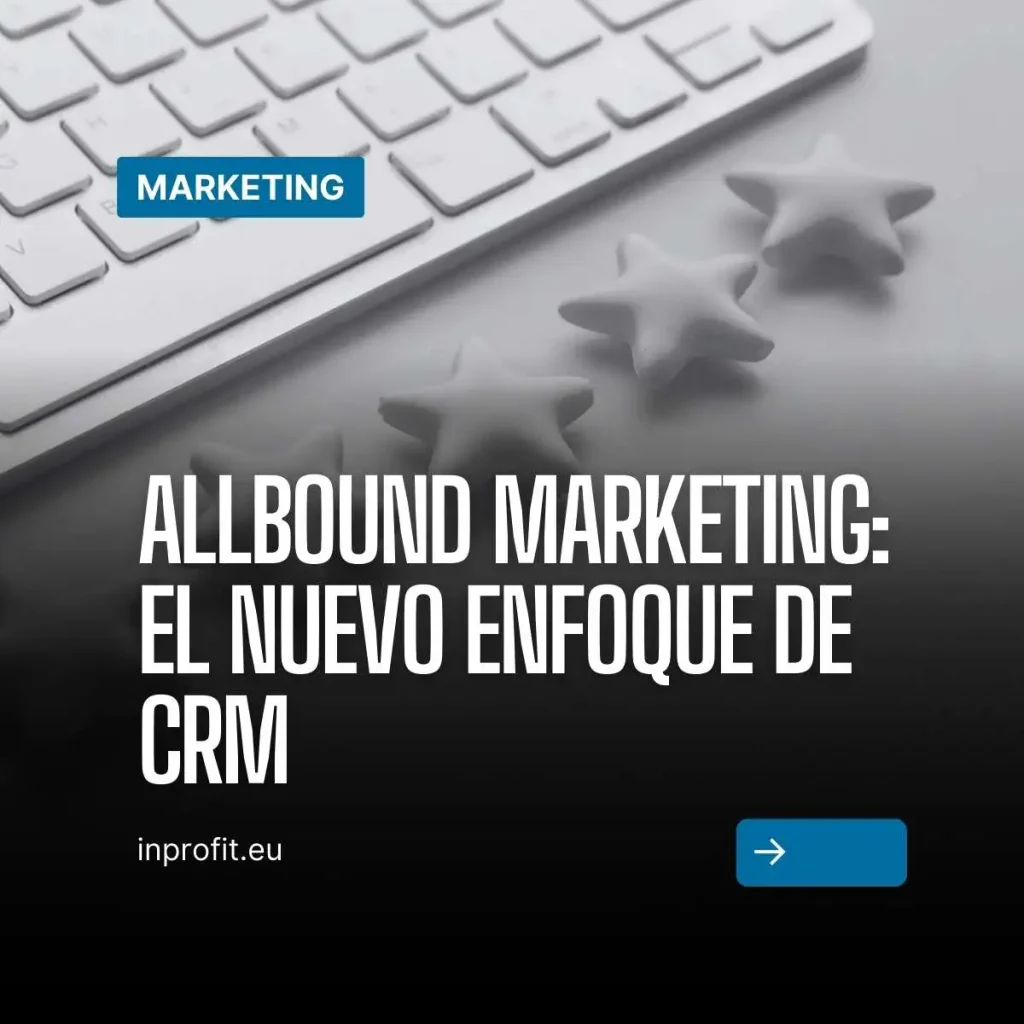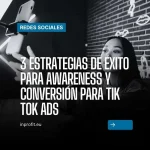If you’ve been immersed in inbound marketing for years, you’ll know that it’s all about attracting leads through valuable content, SEO and an organic online presence. However, today’s landscape demands something more holistic.
This is where allbound marketing comes in, an approach that merges the best of inbound with outbound and account-based tactics, all powered by artificial intelligence (AI) in CRM systems. In this article, we’ll explore how this transition not only optimizes customer relationship management, but also drives sustainable growth for companies.
From Inbound to Allbound Marketing
Get ready to discover how allbound marketing with AI is redefining CRM and why your marketing strategy needs to adapt right now.
Inbound marketing has been the undisputed king for more than a decade. It emerged as a response to consumer fatigue with traditional advertising interruptions, focusing on educating, informing and engaging in a natural way.
Think of blogs like this one, downloadable ebooks or webinars that solve real problems. But what happens when the market becomes saturated and competition for organic attention intensifies? That’s where allbound marketing emerges as the logical evolution.
This model doesn’t just wait for leads to arrive; instead, it proactively integrates outbound tactics, such as personalized emails or direct calls, with inbound nurturing. And CRM with artificial intelligence acts as the central brain, analyzing data in real time to personalize each interaction.
Imagine a system that not only tracks the customer journey, but predicts their needs before they even express them. This synergy is what makes allbound a revolutionary approach to modern marketing.
What exactly is Allbound Marketing?
To understand allbound marketing, we must first break down its components. Inbound, as you know, focuses on creating content that attracts users through search engines, social media and other organic channels. It is passive in the sense that the customer initiates the contact. In contrast, outbound is more aggressive: paid ads, cold calling or mass email campaigns.
Allbound brings these worlds together, with the addition of account-based marketing (ABM), which focuses on specific high-value accounts rather than broad audiences. This merger creates an ecosystem where all tactics work in harmony, guided by accurate data.
What makes allbound unique is its emphasis on internal collaboration. It’s not just marketing; it involves sales, customer service and even operations. For example, a sales team can use inbound insights to qualify outbound leads, while ABM ensures that efforts are focused on prospects with higher conversion potential.
In my experience working with marketing agencies, I’ve seen companies that adopt this approach achieve 20-30% higher close rates, simply because they align all departments under a unified strategy. But the real game-changer is integration with AI-powered CRM, which transforms raw data into actionable actions.
CRM: From basic tool to intelligent engine with AI
Customer Relationship Management (CRM) systems have evolved from simple databases to sophisticated platforms. In the early days, a CRM like Odoo HubSpot was primarily used to store contacts and track interactions. Today, with AI, these systems predict behaviors, automate processes and personalize experiences at scale. In the context of allbound marketing, CRM with artificial intelligence becomes the core that integrates inbound, outbound and ABM.
Consider how AI analyzes patterns in data. For instance, machine learning algorithms can examine the browsing history of an inbound lead and suggest a personalized outbound email. Or, in an ABM scenario, AI identifies accounts similar to your best customers and prioritizes targeted campaigns. This is not science fiction; tools like Einstein AI in Salesforce already make it possible.
I recall a case of a B2B company that implemented a CRM with AI: their qualified leads increased by 40% because the system automatically filtered out irrelevant prospects, allowing the team to focus on real opportunities. Allbound marketing leverages this to create a continuous flow, where every touch with the customer is relevant and timely.
In addition, AI in CRM facilitates advanced segmentation. Instead of basic demographic groups, you can create profiles based on predictive behaviors.
Has a user downloaded several ebooks on SEO? The AI could recommend an outbound webinar on allbound marketing. This personalization reduces churn and increases loyalty, as customers feel understood. But not everything is perfect; implementing these systems requires a learning curve and an initial investment. However, the long-term benefits, such as improved ROI on marketing campaigns, far outweigh the challenges.
Allbound Marketing powered by CRM with AI
Adopting allbound marketing with intelligent CRM brings a multitude of advantages that go beyond traditional metrics. First, it improves operational efficiency. By integrating inbound and outbound, you reduce silos between teams, which speeds up the sales cycle. AI automates repetitive tasks, such as
Another benefit is hyper-personalization. In inbound, content is generic to attract masses; in allbound, AI makes it specific. Imagine sending an outbound email that references a blog post the lead recently read. This not only increases open rates, but builds trust. In addition, ABM focused on key accounts ensures that limited resources are used where they matter most, maximizing return.
Performance measurement is also transformed. With an AI-enabled CRM, you get real-time analytics: Which inbound channel generates the most convertible outbound leads? These insights enable dynamic adjustments, making your marketing strategy agile and responsive. For SMBs, this levels the playing field against corporate giants, as AI democratizes advanced tools.
Finally, allbound encourages innovation. By combining approaches, you stimulate creativity: an inbound video could lead to a personalized outbound demo. And with AI predicting trends, you’re always one step ahead. In short, this approach is not a fad; it’s the future of integrated marketing.
- Greater alignment between departments: Marketing, sales and customer service work in tandem, reducing friction and improving the customer experience.
- Resource optimization: AI prioritizes high-value leads, avoiding waste in ineffective campaigns.
- Scalability: As you grow, the system adapts without the need to hire more staff.
- Regulatory compliance: AI tools help manage data in compliance with regulations such as GDPR.
These points illustrate how allbound with CRM AI not only solves current problems, but prepares your business for future challenges.
How to implement Allbound marketing in your CRM strategy?
Transitioning from inbound to allbound is not an overnight change; it requires planning. Start by evaluating your current CRM: does it support AI? Platforms like HubSpot or Zoho offer out-of-the-box AI modules. If not, consider migrating to one that does.
Next, map your customer journey. Identify points where inbound can complement outbound. For example, after an inbound download, send an AI-automated outbound follow-up. Integrate ABM by selecting 10-20 key accounts and create personalized campaigns.
Train your team. AI is powerful, but it needs humans to interpret it. Offer trainings on data analysis and AI ethics. Monitor metrics like conversion rate and closing time to iterate.
A common mistake is to overload with data; focus on quality over quantity. Use AI to clean databases and eliminate duplicates. Also, integrate external tools: connect your CRM with Google Analytics for inbound insights or with LinkedIn for outbound B2B.
In my career, I have advised companies that, by implementing this, saw a 25% growth in revenue in six months. The key is patience and experimentation. A/B test allbound campaigns to refine.
Ethical challenges in the use of AI
No strategy is foolproof, and allbound with AI has its hurdles. A major one is data privacy. With AI processing sensitive information, make sure you comply with laws such as the LGPD in Latin America. Transparency is vital: inform customers how you use their data.
Another challenge is technology dependency. If the CRM fails, your marketing stops. Mitigate with backups and redundancies. Also, AI can be biased if training data is limited; diversify sources to avoid discrimination.
Ethically, avoid manipulation. Personalization is great, but don’t cross over into invasiveness. Ask yourself: does this interaction add value or just sell? In a post-Cambridge Analytica world, trust is currency.
Despite these, the pros outweigh the cons. Leading companies like Amazon use AI in CRM for seamless experiences, proving that, handled well, it elevates marketing.
- Biases in algorithms: Check regularly to ensure fairness.
- Start-up costs: Invest wisely, starting small.
- Team adoption: Involve everyone from the beginning.
- Constant updates: AI evolves; keep up to date.
Addressing these ensures successful implementation.
Success stories
To illustrate, look at HubSpot itself. They went from pure inbound to allbound, using their AI-enabled CRM to integrate sales and marketing. Result: exponential growth in qualified leads.
Another example is Adobe, which combines inbound content with outbound ads, powered by Adobe Sensei (its AI). Its targeted ABM generates millions in revenue.
In Latin America, Mercado Libre uses AI in CRM to personalize recommendations, merging inbound searches with outbound notifications. This has boosted its e-commerce dominance.
These cases show that, regardless of size, allbound works. Learn from them: focus on data, personalize and measure.
The future of marketing is smart
From inbound to allbound marketing, the journey is about integration and innovation. With AI-powered CRM, you don’t just manage customers; you anticipate and delight them. If your strategy is still purely inbound, it’s time to evolve. Implement allbound for holistic growth, greater efficiency and authentic connections.
Ready to take the leap? Evaluate your CRM, integrate AI and watch it transform your marketing. The future doesn’t wait; act now to lead in an increasingly connected and personalized world.

Marketing tecnológico en vena. Fanático de las tecnologías Martech que rompen moldes: IA generativa, blockchain, no-code, metaverso, automatización extrema… Convencido de que el futuro no se espera, se construye (y se vende muy bien).
Responsable del marketing más disruptivo y tecnológico.




